Laser Cataract Surgery Raleigh, NC

Understanding Cataracts & Laser Cataract Surgery
Cataracts refer to when the lens of the eye becomes cloudy. This gradually begins to obscure vision and can lead to blindness. It can occur in one or both eyes. Cataracts are mostly associated with age and tend to develop most in people above the age of 50. However, certain medical conditions or genetics can cause premature cataract formation.
Risk factors for cataracts include:
- Smoking
- Diabetes
- Family history of developing cataracts earlier in life
- Streoid use (prescription or recreational)
- Past eye injury or surgery
- High blood pressure
- Excessive exposure to the sun and UV rays
The only effective treatment for cataracts is surgical cataract removal. Regardless of the technique used, it is an exceptionally safe surgery and patients can usually remain awake. Cataract surgery is an outpatient procedure in most cases.

Traditional vs. Laser Cataract Surgery
There are two primary techniques surgeons use to remove cataracts. Traditional cataract surgery involves the surgeon making incisions in the lens with small, specialized surgical instruments. Laser cataract removal replaces the initial step with lasers that make precise incisions and openings in the lens.
After this, the two procedures are extremely similar. The traditional and laser methods are both widely used today. Many prefer laser cataract surgery because of its precision. However, it is often not fully covered by medical insurance, but this will vary. This should not deter patients from choosing the method best for them.
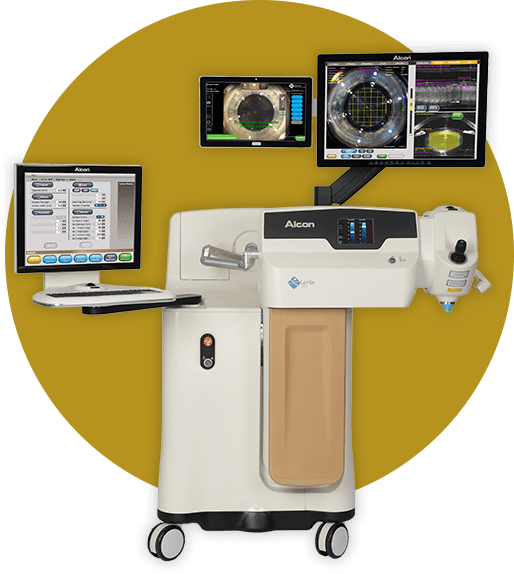

Benefits
There are many benefits of laser cataract surgery. Cataract surgery is a medical procedure more than a cosmetic one. Thus, the short surgery can have a profound effect. Some of the benefits include:
- Improve vision and field of vision
- Prevent vision loss and blindness
- Remove visible clouding of the eye
- May help correct a minor astigmatism
- Better placement of the artificial lens
- Reduced risk of corneal swelling
- High level of precision
- Short recovery time
- Can perform many normal activities right away
- Less invasive
- Patient can remain awake and perfectly comfortable
- Best for treating hard cataracts
- More accuracy for abnormal or difficult anatomy
- Performed by board certified surgeon in both ophthalmological surgery and cosmetic surgery
Bladeless Cataract Surgery Overview
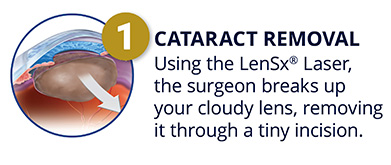
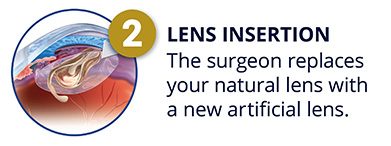
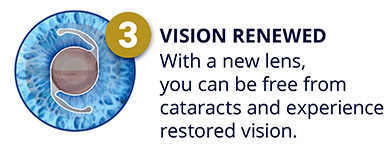
The comparison between healthy Eye and Eye with Cataract
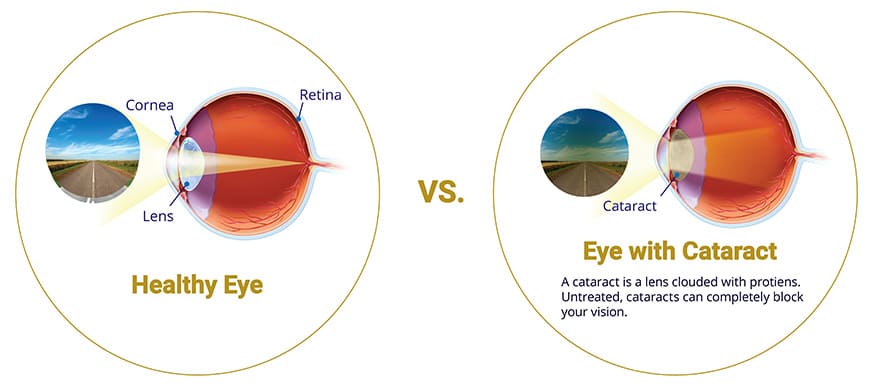
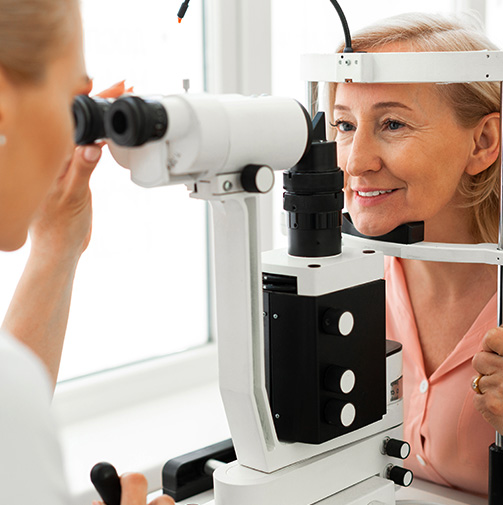
Laser Cataract Surgery Before & After
Before
The first step to seeking Raleigh laser cataract surgery is to schedule a consultation with Dr. Jindal. He perform an examine and discuss the patient’s symptoms, medical history, and lifestyle. If Dr. Jindal determines the patient has cataracts that can be removed with surgery, he will describe the process and provide the patient with everything they need to know before the surgery.
Preparation
Laser cataract surgery does not require general anesthesia. Therefore, in most cases, patients can eat and drink before their surgery. To prep one or both eyes for surgery, the patient will receive an IV. Then, eye drops are administered to dilate and numb the eyes. The laser then used 3D imaging to map the anatomy of the eye. This allows for top precision when creating the incisions and placing the intraocular lens, IOL.
Patients may take an oral sedative beforehand to keep them relaxed. When the eye mapping is done, Dr. Jindal will activate the laser and begin surgery.
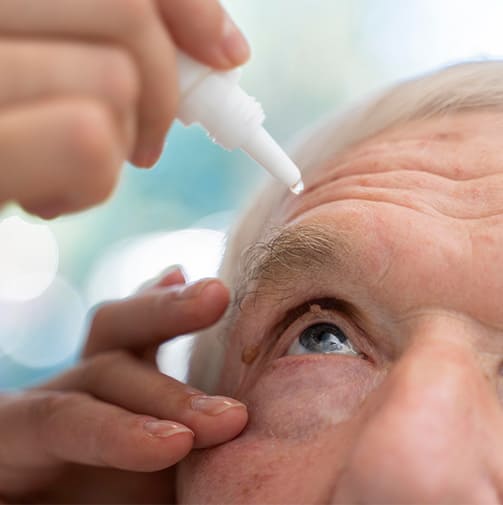
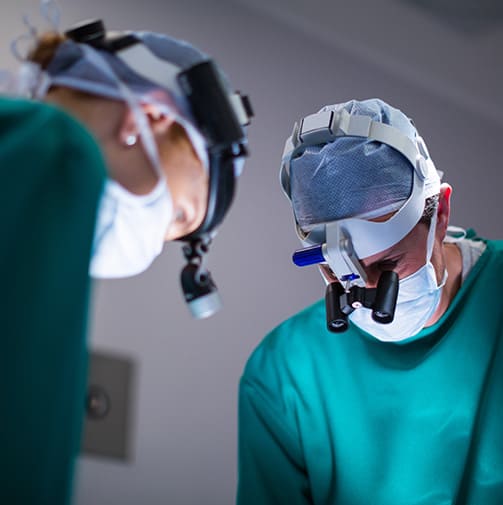
Surgery
The laser creates a small circular incision in the eye to access the lens. The laser will then segment the lens into multiple pieces. Using ultrasound waves, Dr. Jindal breaks up the cataract and small suction tool removes the clouded lens. The entire procedure takes around 30 minutes per eye. During the laser portion, patients often see bright lights and may feel some light pressure due to the laser’s closeness.
The final part of the surgery—the placement of the new lens—is performed manually. Dr. Jindal will place the new artificial lens using the guide of the 3D model the laser created. Once the lens is in place, the surgery is complete.
Recovery
Dr. Jindal will place an eye shield over the eye operated on. This helps protect it from light and debris. This can eye shield can usually be removed the next day. Generally, the recovery after cataract surgery is not overly difficult and patients return to work and most of their normal life within one to three days.
It is normal for several weeks to experience some dryness or rings around the vision. Patients should also avoid strenuous activity for two weeks as a precaution. Patients will use eye drops immediately after surgery to keep eyes moist, allwviate discomfort, and promote optimal healing.

Frequently Asked Questions
Is Cataract Surgery Necessary?
In most cases, yes, if left untreated, cataracts can lead to blindness. Blindness from cataract is no longer common due to today’s treatments. When catracts begin to significantly obscure vision, it is time to consider cataract removal surgery.
What Is The Best Age For Cataract Surgery?
There is not one particular age for cataract surgery. If cataracts are present and cannot be adequately treated with vision correction, then surgery is likely the best solution. Cataract surgery is even performed on children if necessary. As long as a patient is healthy enough for surgery, age is not overly important.
Are There Aftercare Instructions After Laser Cataract Surgery?
Even though patients can return to normal lift fairly quickly after laser cataract surgery, patients will still need to follow some instructions for a couple of weeks after surgery. These instructions may include:
- Keep the eye shield on overnight after surgery
- Apply eye drops as instructed
- Prevent anything foreign getting into the eyes including water, shampoo, hairspray, etc.
- Do not wear eye makeup for one to two weeks
- Avoid rubbing or touching the eyes
- Be mindful of products used on the face
- Wear sunglasses when going outside during the day or if it is particularly bright
- Refrain from strenuous activity or exercise for two weeks or until Dr. Jindal okays it
What Percentage Of Cataract Surgeries Are Successful?
99% of cataract surgeries—both traditional and laser—are successful. Few patients experience major complications and most will see a noteable improvement in their vision. Many have better vision than before they developed cataracts.
Are The Results Of Laser Cataract Surgery Permanent?
It depends. Cataracts can always recur, even with an artificial lens. However, for most patients, this will not happen. If a patient had cataract surgery very young, this may increase their chances of needing another surgery as they age. Generally, though, the results of cataract surgery are permanent.
The Best Laser Cataract Surgery In Raleigh, NC By Oculoplastic Surgeon, Dr. Sumeet Jindal
Dr. Sumeet Jindal is a trained oculoplastic surgery who has performed both functional and cosmetic laser eye surgeries. He is board certified in ophthalmology, laser surgery, and cosmetic surgery. This makes him one of the top Raleigh surgeons for laser cataract surgery. The JIYA Instiute For Youthful Aging addresses the cosmetic and functional changes the face sees with age. Dr. Jindal provides the best laser cataract surgery Raleigh performs.
To learn more and schedule a consultation, call us at (919) 929-6006. Patients can also reach out online via chat contact form or Price Simulator.